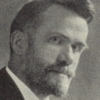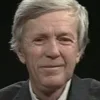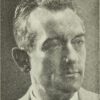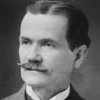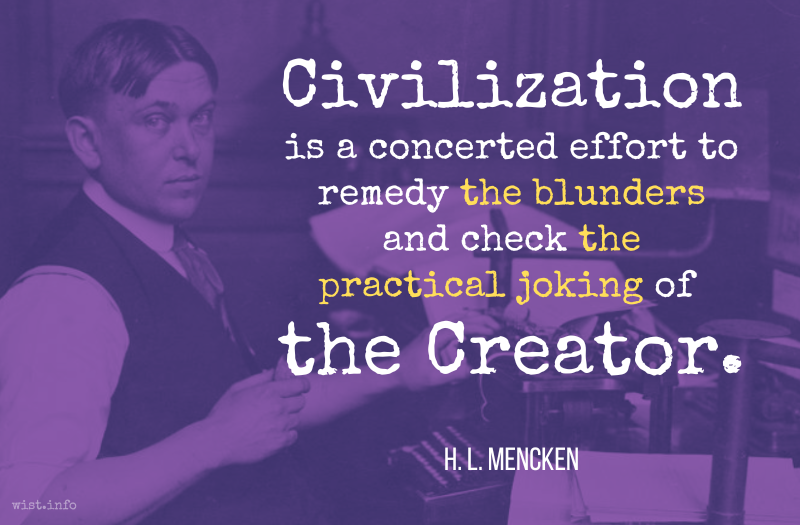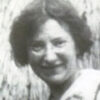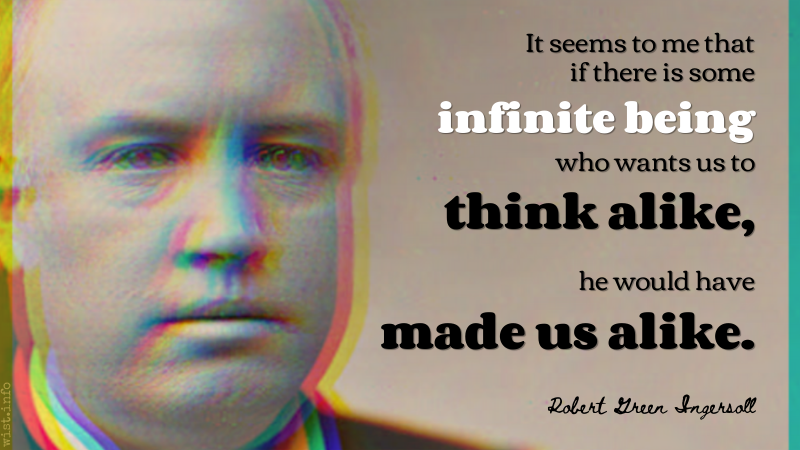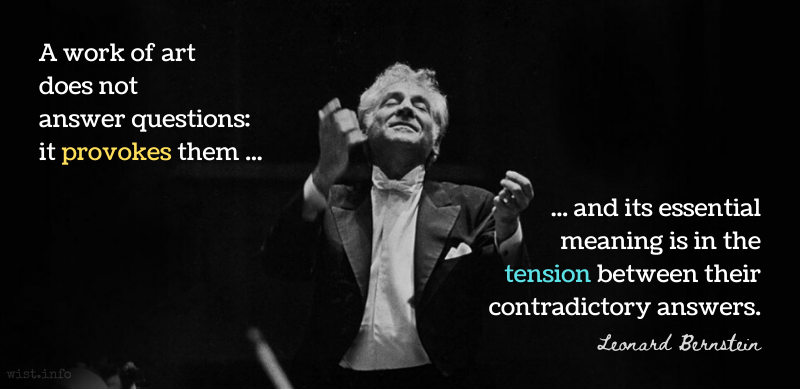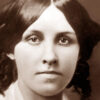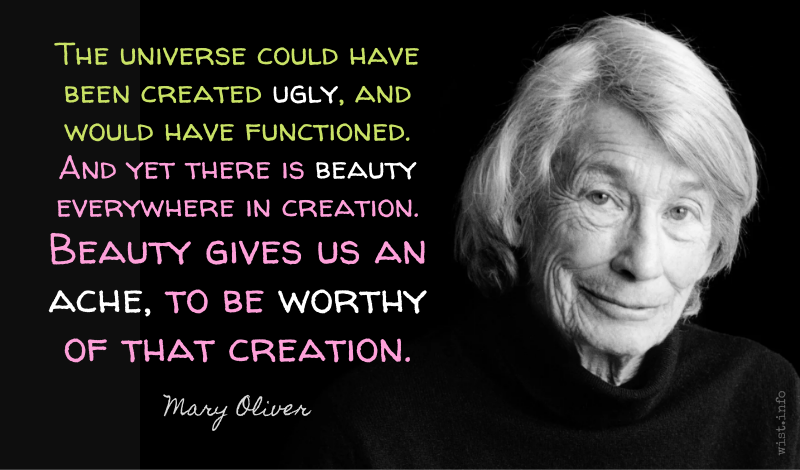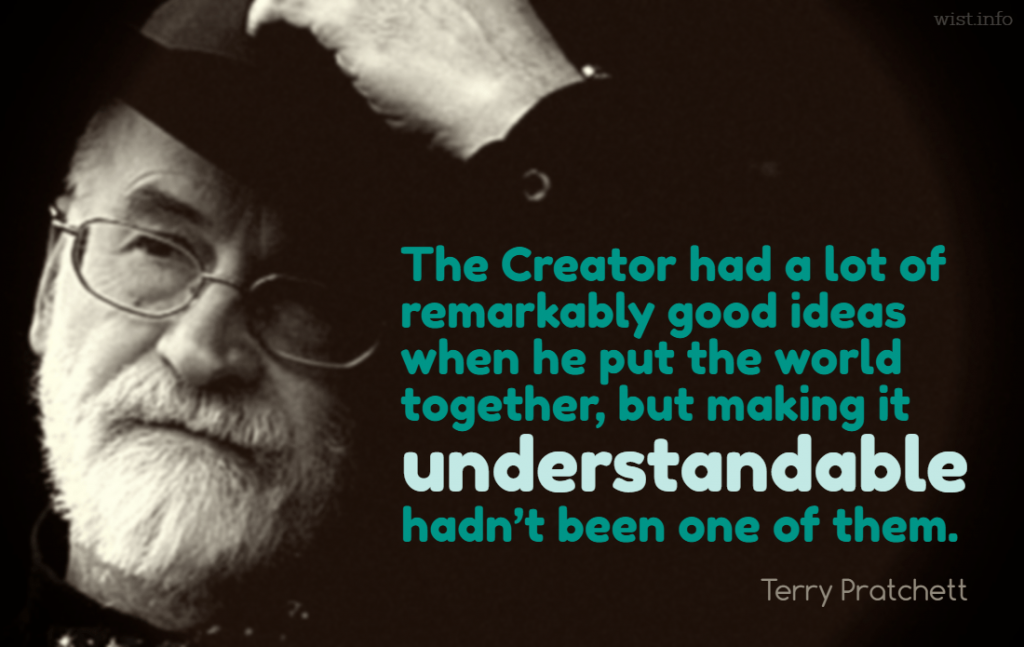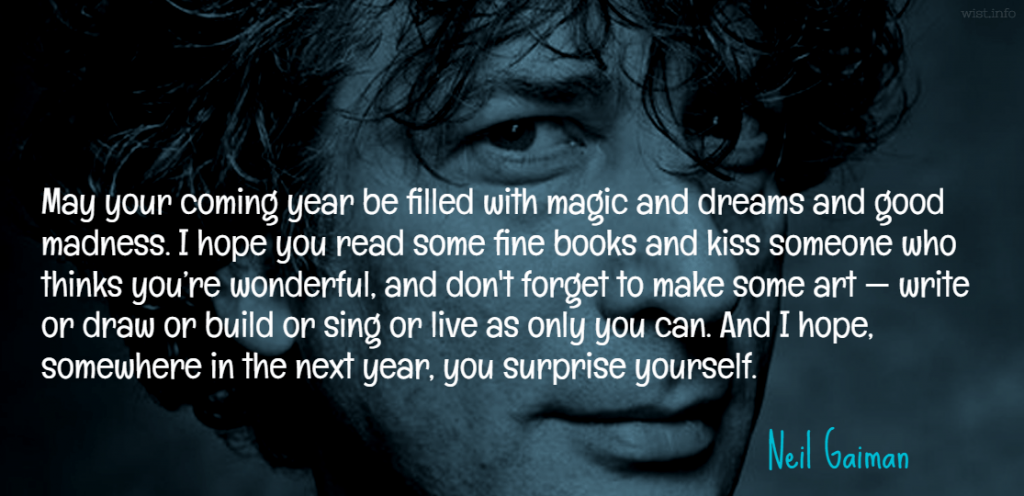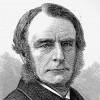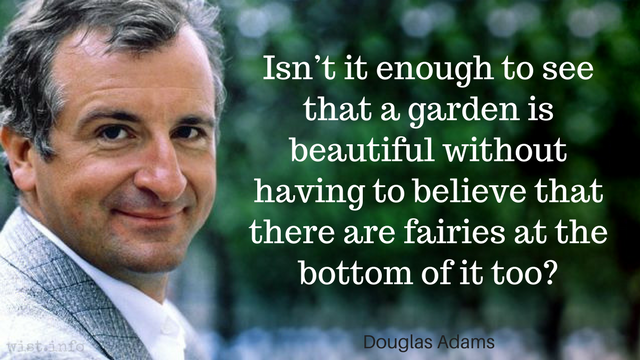When I come to my own beliefs, I find myself quite unable to discern any purpose in the universe, and still more unable to wish to discern one. Those who imagine that the course of cosmic evolution is slowly leading up to some consummation pleasing to the Creator, are logically committed (though they usually fail to realize this) to the view that the Creator is not omnipotent or, if He were omnipotent, He could decree the end without troubling about means.
Bertrand Russell (1872-1970) English mathematician and philosopher
“Is There a God?” (1952)
(Source)
Essay commissioned by Illustrated magazine in 1952, but never published there. First publication in Russell, Last Philosophical Testament, 1943-68 (1997) [ed. Slater/Köllner].
Quotations about:
creation
Note not all quotations have been tagged, so Search may find additional quotes on this topic.
It has been one of the defects of theologians at all times to over-estimate the importance of our planet. No doubt this was natural enough in the days before Copernicus when it was thought that the heavens revolve about the earth. But since Copernicus and still more since the modern exploration of distant regions, this pre-occupation with the earth has become rather parochial. If the universe had a Creator, it is hardly reasonable to suppose that He was specially interested in our little corner. And, if He was not, His values must have been different from ours, since in the immense majority of regions life is impossible.
Bertrand Russell (1872-1970) English mathematician and philosopher
“Is There a God?” (1952)
(Source)
Essay commissioned by Illustrated magazine in 1952, but never published there. First publication in Russell, Last Philosophical Testament, 1943-68 (1997) [ed. Slater/Köllner].
Enlarge within us the sense of fellowship with all the living things, our little brothers, to whom thou hast given this earth as their home in common with us. We remember with shame that in the past we have exercised the high dominion of man with ruthless cruelty, so that the voice of the Earth, which should have gone up to thee in song, has been a groan of travail. May we realize that they live, not for us alone, but for themselves and for thee, and that they love the sweetness of life even as we, and serve thee in their place better than we in ours.
Walter Rauschenbusch (1861-1918) American theologian, social reformer, Baptist pastor
Prayers of the Social Awakening, “For the World” (1910)
(Source)
This prayer is frequently misattributed to St Basil of Caesarea, often in a variant form such as this:
Oh God enlarge within us the sense of fellowship with all living things, our brothers the animals to whom Thou gavest the earth in common with us. We remember with shame that in the past we have exercised the high dominion of man with ruthless cruelty so that the voice of the earth, which should have gone up to Thee in song, has been a groan of travail.
The attributions to Basil are usually without citation, or with citations that are spurious in some fashion. For example, in Matthew Scully, Dominion: The Power of Man, the Suffering of Animals, and the Call to Mercy (2002), he cites Schaff and Wace, eds., A Select Library of the Nicene and Post-Nicene Fathers of the Christian Church, Second Series, Vol. 8 (1897), which is in fact about Basil's writings, but which does not appear to include this prayer.
Further discussion, in detail, can be found here: St. Basil’s “Animal Prayers” are a “Hoax” (Part One) | Animals Matter to God.
Indeed, it is a cruel truth of the history of all art and literature that most would-be poets, writers, and painters fail. The man or woman of real talent is rare, the born genius rarer still. For every book that survives the merciless judgment of time, there are nine hundred and ninety-nine rotting unread in libraries and nine thousand and ninety-nine that were never written in the first place.
Michael Harrington (1928-1989) American writer, political activist, political scientist [Edward Michael Harrington, Jr.]
Fragments of the Century, ch. 2 “The Death of Bohemia” (1973)
(Source)
A book is never finished, it is abandoned.
Gene Fowler (1890-1960) American journalist, author, and dramatist. [b. Eugene Devlan]
Quoted in H. Allen Smith, The Life and Legend of Gene Fowler, ch. 27 (1977)
(Source)
The man who consciously owns a tree and knows how to use it and gives you thanks for it may not know its exact height or how widely the branches spread; but he is better off than the man who, while he has measured the tree and counted all its branches, neither owns it nor knows and loves its creator.
[Sicut enim melior est qui novit possidere arborem et de usu eius tibi gratias agit, quamvis nesciat vel quot cubitis alta sit vel quanta latitudine diffusa, quam ille qui eam metitur et omnes ramos eius numerat et neque possidet eam neque creatorem eius novit aut diligit.]
Augustine of Hippo (354-430) Christian church father, philosopher, saint [b. Aurelius Augustinus]
Confessions, Book 5, ch. 4 / ¶ 7 (5.4.7) (c. AD 398) [tr. Warner (1963)]
(Source)
(Source (Latin)). Alternate translations:
For as he is better off who knows how to possess a tree, and return thanks to Thee for the use thereof, although he know not how many cubits high it is, or how wide it spreads, than he that can measure it, and count all its boughs, and neither owns it, nor knows or loves its Creator.
[tr. Pusey (1838)]
But as he is happier who knows how to possess a tree, and for the use thereof renders thanks to Thee, although he may not know how many cubits high it is, or how wide it spreads, than he that measures it and counts all its branches, and neither owns it nor knows or loves its Creator.
[tr. Pilkington (1876)]
For as he is better off who knows how to possess a tree, and gives thanks for its use, though he knows not its height or breadth, than he who has accurate knowledge of its dimensions , and the number of its boughs, and yet does not own it, and neither knows nor loves its Creator.
[tr. Hutchings (1890)]
For as he who knows that he owns a tree, and gives thanks to thee for its use, although he knows not how many feet high it is, or how wide it spreads, is better than he who measures it and counts all its branches, yet neither owns it nor knows nor loves its Creator.
[tr. Bigg (1897), 5.4.2]
For just as he is better who knows he possesses a tree and gives thanks to You for the use it is to him, although he does not know how many cubits high it is or the width of its spread, than another man who can measure it and number its branches but neither possesses it nor knows and loves Him who created it.
[tr. Sheed (1943)]
For just as that man who knows how to possess a tree, and give thanks to thee for the use of it -- although he may not know how many feet high it is or how wide it spreads -- is better than the man who can measure it and count all its branches, but neither owns it nor knows or loves its Creator.
[tr. Outler (1955)]
A man who knows that he owns a tree, and gives thanks to you for its fruit, even though he may not know how many cubits high it is or how wide it spreads, is better than one who measures it and counts all its branches, but does not own it and does not know or love its creator.
[tr. Ryan (1960)]
A man who knows that he owns a tree and thanks you for the use he has of it, even though he does not know its exact height or the width of its spread, is better than another who measures it and counts all its branches, but neither owns it nor knows and loves its Creator.
[tr. Pine-Coffin (1961)]
For example, he is the better man who knows how to own a tree and thanks you for its usefulness, though he does not know how many cubits high it is, or how broad its spread, than the man who measures it, counts its branches, but never calls it his own or esteems the one who made it.
[tr. Blaiklock (1983)]
Someone who knows enough to become the owner of a tree, and gives thanks to you for the benefits it brings him, is in a better state, even if ignorant of its height in feet and the extent of its spread, than another who measures and counts all its branches but neither owns it nor knows its creator nor loves him.
[tr. Boulding (1997)]
For of old
Rome said to me — “Your readers are your gold.
By them the stream of Lethe you’ll survive,
By them the better part of you will live.”
The wild fig splits Messalla’s marbles through,
And Crispus’ steeds are shattered quite in two :
But books are helped by time nor hurt by thieves,
Memorials that death uninjured leaves.[Quem cum mihi Roma dedisset.
“Nil tibi quod demus maius habemus” ait.
“Pigra per hunc fugies ingratae flumina Lethes
Et meliore tui parte superstes eris.
Marmora Messallae findit caprificus, et audax
Dimidios Crispi mulio ridet equos:
At chartis nec furta nocent et saecula prosunt,
Solaque non norunt haec monumenta mori.”]Martial (AD c.39-c.103) Spanish Roman poet, satirist, epigrammatist [Marcus Valerius Martialis]
Epigrams [Epigrammata], Book 10, epigram 2 (10.2) (AD 95, 98 ed.)[tr. Pott & Wright (1921)]
(Source)
(Source (Latin)). Alternate translations:
Reader, my wealth; whom when to me Rome gave,
Nought greater to bestow (quoth she) I have.
By him ingratefull Lethe thou shalt flye,
And in thy better part shalt never dye.
Wilde Fig-trees rend Messalla's Marbles off;
Crispus halfe-horses the bold Carters scoffe.
Writings no age can wrong, no thieving hand.
Deathlesse alone those Monuments will stand.
[tr. May (1629)]
When Fate to me a constant reader gave;
Receive, she said, the greatest boon I have.
By this beyond oblivion's stream arrive;
And in your better party by this survive.
Statues may moulder; and the clown unbred
Scoff at young Ammon's horse without his head.
But finish'd writings theft and time defy;
The only monument, which cannot die.
[tr. Hay (1755)]
Reader, our riches! Well, said, Rome, I know,
A blester boon I have not to bestow.
By this though thro' Lethean streams shalt strive,
And in thy better part shalt still survive.
The wilding may Messala's marble cleave,
The speaker silence, and the sculptor reave.
The mule's pert driver may reproachless laugh,
At Crispus' coursers dwindled down to half.
Wit's labors onely rape or age defy:
His monuments alone can never die.
[tr. Elphinston (1782)]
When Rome gave you [readers] to me, she said, "I have nothing greater to give you. By his means you will escape the sluggish waves of ungrateful Lethe, and will survive in the better part of yourself. The marble tomb of Messale is split by the wild fig, and the audacious muleteer laughs at the mutilated horses of the statue of Crispus.1 But as for writings, they are indestructible either by thieves or the ravages of time; such monuments alone are proof against death."
[tr. Bohn's Classical (1859)]
For when Rome had given you to me, she said: We have nothing greater to give you. By him will you escape unthankful Lethe's sluggish stream, and will in your better part survive. Messalla's marble the wild-fig sunders, and boldly the mule-driver laughs at Crispus' steeds broken in two. But writings thefts do not injure, and time befriends them, and alone these monuments know not death."
[tr. Ker (1919)]
Rome can tell how dear,
Who gave thee, saying, "Take my best; 'tis here;
By him ungrateful Lethe thou shallt flee
And thy best parts have immortality."
The fig-tree splits Messala's marble blocks,
And the rough drover draggled Crispus mocks.
Verses grow great with Time and Fate defy;
Such monuments alone can never die.
[tr. Francis & Tatum (1924), ep. 508]
When Rome gave you to me, she said: "I have nothing greater to give you. through him you will escape ungrateful Lethe's idle waters and survive in the better part of yourself. The fig tree splits Messalla's marble, the bold muleteer laughs at Crispus' halved horses. But thefts do not harm paper and the centuries do it good. These are the only memorials that cannot die."
[tr. Shackleton Bailey (1993)]
Reader, Patron, willed to me by Rome
saying: "No greater gift! Through him
You'll flee neglectful Lethe's stagnant flood --
the better part of you survive.
Wild-fig rives the marble, heedless muleteers
deride the busted steeds of bronze.
But verse no decrease knows, time adds to verse,
deathless alone of monuments."
[tr. Whigham (1985), "Rome's Gift"]
To laugh sturdily and often, and to wear a long belt, are not incongruous with sanctity. God’s image is in every man, high or low — a road puddle holds the moon as well as the sea.
Austin O'Malley (1858-1932) American ophthalmologist, professor of literature, aphorist
Keystones of Thought (1914)
(Source)
Civilization is a concerted effort to remedy the blunders and check the practical joking of the Creator.
H. L. Mencken (1880-1956) American writer and journalist [Henry Lewis Mencken]
A Little Book in C Major, ch. 2, § 2 (1916)
(Source)
Variant:
CIVILIZATION. A concerted effort to remedy the blunders and check the practical joking of God.
[A Book of Burlesques, "The Jazz Webster" (1924)]
Morning has broken,
Like the first morning,
Blackbird has spoken
Like the first bird.
Praise for the singing!
Praise for the morning!
Praise for them springing
Fresh from the Word!Eleanor Farjeon (1881-1965) English author
“Morning Has Broken” (1931)
(Source)
Set to music and popularized by Cat Stevens in Teaser and the Firecat (1971).
The primary benefit of practicing any art, whether well or badly, is that it enables one’s soul to grow.
Kurt Vonnegut, Jr. (1922-2007) American novelist, journalist
“Despite Tough Guys, Life Is Not the Only School for Real Novelists,” New York Times (1999-05-24)
(Source)
Part of the Times "Writers on Writing" series.
In Man Without a Country, ch. 3 "Here Is a Lesson in Creative Writing" (2005), Vonnegut expanded on this:
Practicing an art, no matter how well or badly, is a way to make your soul grow, for heaven's sake. Sing in the shower. Dance to the radio. Tell stories. Write a poem to a friend, even a lousy poem. Do it as well as you possibly can. You will get an enormous reward. You will have created something.
Therefore Father, you who have given visible light as the first fruits of creation and, at the summit of your works, have breathed intellectual light into the face of man, protect and govern this work, which began in your goodness and and returns to your glory.
[Itaque Tu Pater, qui lucem visibilem primitias creaturae dedisti, et lucem intellectualem ad fastigium operum tuorum in faciem hominis inspirasti; opus hoc, quod a tua bonitate profectum tuam gloriam repetit, tuere et rege.]
Francis Bacon (1561-1626) English philosopher, scientist, author, statesman
Instauratio Magna [The Great Instauration], “Distributo Operis [Plan of the Work]” (1620) [tr. Silverthorne (2000)]
(Source)
(Source (Latin)). Alternate translations:
May thou, therefore, O Father, who gavest the light of vision as the first-fruits of creation, and hast inspired the countenance of man with the light of the understanding as the completion of thy works, guard and direct this work, which, proceeding from thy bounty, seeks in return thy glory.
[tr. Wood (1831)]
May thou, therefore, O Father, who gavest the light of vision as the first fruit of creation, and who hast spread over the fall of man the light of thy understanding as the accomplishment of thy works, guard and direct this work, which, issuing from thy goodness, seeks in return thy glory!
[tr. Wood/Devey (1844)]
Therefore do thou, O Father, who gavest the visible light as the first fruits of creation, and didst breathe into the face of man the intellectual light as the crown and consummation thereof, guard and protect this work, which coming from thy goodness returneth to thy glory.
[tr. Spedding (1858)]
I do not claim any ability to read God’s mind. I am sure of only one thing. When we look at the glory of stars and galaxies in the sky and the glory of forests and flowers in the living world around us, it is evident that God loves diversity. Perhaps the universe is constructed according to a principle of maximum diversity.
Freeman Dyson (1923-2020) English-American theoretical physicist, mathematician, futurist
“Progress in Religion,” Templeton Prize acceptance speech, Washington National Cathedral (9 May 2000)
(Source)
Perhaps the meaning of all human activity lies in the artistic consciousness, in the pointless and selfless creative act? Perhaps our capacity to create is evidence that we ourselves were created in the image and likeness of God?
Andrei Tarkovsky (1932-1986) Russian film director, screenwriter, film theorist [Андрей Арсеньевич Тарковский]
Sculpting in Time (1986) [tr. Hunter-Blair]
(Source)
Never try to convey your idea to the audience — it is a thankless and senseless task. Show them life, and they’ll find within themselves the means to assess and appreciate it.
Hitherto I have been under the guidance of that portion of reason which He has thought proper to deal out to me. I have followed it faithfully in all important cases, to such a degree at least as leaves me without uneasiness; and if on minor occasions I have erred from its dictates, I have trust in Him who made us what we are, and knows it was not His plan to make us always unerring.
Thomas Jefferson (1743-1826) American political philosopher, polymath, statesman, US President (1801-09)
Letter to Miles King (26 Sep 1814)
(Source)
THE LORD
And do you have no other news?
Do you come always only to accuse?
Does nothing please you ever on the earth?MEPHISTOPHELES
No, Lord! I find it still of precious little worth.
I feel for mankind in their wretchedness,
It almost makes me want to plague them less.DER HERR
Hast du mir weiter nichts zu sagen?
Kommst du nur immer anzuklagen?
Ist auf der Erde ewig dir nichts recht?MEPHISTOPHELES
Nein Herr! ich find es dort, wie immer, herzlich schlecht.
Die Menschen dauern mich in ihren Jammertagen,
Ich mag sogar die armen selbst nicht plagen.Johann Wolfgang von Goethe (1749-1832) German poet, statesman, scientist
Faust: a Tragedy [eine Tragödie], Part 1, sc. 3 “Prologue in Heaven,” l. 301ff (1808-1829) [tr. Arndt (1976)]
(Source)
(Source (German)). Alternate translations:
THE LORD
You've nothing more to say to me?
You come but to complain unendingly?
Is never aught right to your mind?
MEPHISTOPHELES
No, Lord! All is still downright bad, I find.
Man in his wretched days makes me lament him;
I am myself reluctant to torment him.
[tr. Priest (1808)]
THE LORD
Have you no more to say. Do you come here
Always to scold, and cavil, and complain?
Seems nothing ever right to you on earth?
MEPHISTOPHELES
No, Lord! I find all there, as ever, bad at best.
Even I am sorry for man's days of sorrow;
I could myself almost give up the pleasure
Of plaguing the poor things.
[tr. Shelley (1815)]
THE LORD: Have you nothing else to say to me? Are you always coming for no other purpose than to complain? Is nothing ever to your liking upon earth?
MEPHISTOPHELES: No, Lord! I find things there, as ever, miserably bad. Men, in their days of wretchedness, move my pity; even I myself have not the heart to torment the poor things.
[tr. Hayward (1831)]
THE LORD
Hast thou naught else to say? Is blame
In coming here, as ever, thy sole aim?
Does nothing on the earth to thee seem right?
MEPHISTOPHELES
No, Lord! I find things there, as ever, in sad plight.
Men, in their evil days, move my compassion;
Such sorry things to plague is nothing worth.
[tr. Swanwick (1850)]
THE LORD
Hast nothing for our edification?
Still thy old work of accusation?
Will things on earth be never right for thee?
MEPHISTOPHELES
No, Lord! I find them still as bad as bad can be.
Poor souls! their miseries seem so much to please 'em,
I scarce can find it in my heart to tease 'em.
[tr. Brooks (1868)]
THE LORD
Hast thou, then, nothing more to mention?
Com'st ever, thus, with ill intention?
Find'st nothing right on earth, eternally?
MEPHISTOPHELES
No, Lord! I find things, there, still bad as they can be.
Man's misery even to pity moves my nature;
I've scarce the heart to plague the wretched creature.
[tr. Taylor (1870)]
THE LORD
Hast thou then nothing more to say?
And art thou here again to-day
To vent thy grudge in peevish spite
Against the earth, still finding nothing right?
MEPHISTOPHELES
True, Lord; I find things there no better than before;
I must confess I do deplore
Man’s hopeless case, and scarce have heart myself
To torture the poor miserable elf.
[tr. Blackie (1880)]
THE LORD
Is that the sum of thy narration?
Hast never aught but accusation?
Still upon Earth is nothing to thy mind?
MEPHISTOPHELES
No, Lord! all things on Earth still downright bad I find.
Mortals their piteous fate upon the rack so stretches,
Myself have scarce the heart to plague the wretches.
[tr. Latham (1908)]
THE LORD
Can you not speak but to abuse?
Do you come only to accuse?
Does nothing on the earth seem to you right?
MEPHISTO:
No, Lord. I find it still a rather sorry sight.
Man moves me to compassion, so wretched is his plight.
I have no wish to cause him further woe.
[tr. Kaufmann (1961)]
THE LORD
Is this all you can report?
Must you come forever to accuse?
Is nothing ever right for you on earth?
MEPHISTOPHELES
No, my Lord. I find it there, as always, thoroughly revolting.
I pity men in all their misery
and actually hate to plague the wretches.
[tr. Salm (1962)]
THE LORD
And that is all you have to say?
Must you complain each time you come my way?
Is nothing right in your terrestrial scene?
MEPHISTOPHELES
No, sir! The earth's as bad as it has always been.
I really feel quite sorry for mankind;
Tormenting them myself's no fun, I find.
[tr. Luke (1987)]
THE LORD
Is that all you have got to say to me?
Is that all you can do, accuse eternally?
Is nothing ever right for you down there, sir?
MEPHISTOPHELES
No, nothing, Lord -- all's just as bad as ever.
I really pity humanity's myriad miseries,
I swear I hate tormenting the poor ninnies.
[tr. Greenberg (1992)]
THE LORD
Why are you telling me all this again?
Do you always come here to complain?
Could there be something good on earth that you've forgotten?
MEPHISTOPHELES
No, Lord! I'm pleased to say it's still completely rotten.
I feel quite sorry for their miserable plight;
When it's as bad as that, tormenting them's not right.
[tr. Williams (1999), l. 293ff]
GOD
Have you nothing else to name?
Do you always come here to complain?
Does nothing ever go right on the Earth?
MEPHISTOPHELES
No, Lord! I find, as always, it couldn’t be worse.
I’m so involved with Man’s wretched ways,
I’ve even stopped plaguing them, myself, these days.
[tr. Kline (2003)]
I sometimes think that God in creating man, somewhat over-estimated his ability.
Oscar Wilde (1854-1900) Irish poet, wit, dramatist
(Attributed)
(Source)
The quotation first appears, without much citation, in Francis Douglas, Oscar Wilde and the Black Douglas, ch. 2 (1940), four decades after Wilde's death. Further discussion of the quotation here: God In Creating Man, Somewhat Overestimated His Ability – Quote Investigator
Cain Mongfish’s masterpiece, A Reasoned Diatribe Regarding thee Methods and Required Madnesses Towards the Manipulation of ye Stuffe of Life and thee Entertaining Consequences Thereof and How Best to Avoid Them is regarded as the seminal work that gathered and codified all of the then-known processes for reanimating, bending, warping, and subjugating life as we know it. Cain died while researching a sequel, which according to his notes was to be entitled How to Promote and Manipulate thee Natural Fealty and Gratitude That Thine Creation Will Express Towards Thou, Their Creator. For some reason, that never works.
—Phil Foglio (b. 1956) American writer, cartoonist
Agatha H and the Voice of the Castle (2014) [with Kaja Foglio]
(Source)
This is what the prophets discovered. History is a nightmare. There are more scandals, more acts of corruption, than are dreamed of in philosophy. It would be blasphemous to believe that what we witness is the end of God’s creation. It is an act of evil to accept the state of evil as either inevitable or final. Others may be satisfied with improvement, the prophets insist upon redemption. The way man acts is a disgrace, and it must not go on forever.
A transition from an author’s book to his conversation is too often like an entrance into a large city after a distant prospect. Remotely, we see nothing but spires of temples, and turrets of palaces, and imagine it the residence of splendor, grandeur, and magnificence; but when we have passed the gates, we find it perplexed with narrow passages, disgraced with despicable cottages, embarrassed with obstructions, and clouded with smoke.
Samuel Johnson (1709-1784) English writer, lexicographer, critic
The Rambler, #14 (5 May 1784)
(Source)
If the human body is obscene, complain to the manufacturer!
Larry Flynt (1942-2021) American publisher and pornographer
Sex, Lies & Politics: The Naked Truth (2004)
(Source)
It seems to me that if there is some infinite being who wants us to think alike, he would have made us alike.
Robert Green Ingersoll (1833-1899) American lawyer, agnostic, orator
Speech to the Jury, Trial of C. B. Reynolds for Blasphemy, Morristown, New Jersey (May 1887)
(Source)
Perhaps God made cats so that man might have the pleasure of fondling the tiger ….
Robertson Davies (1913-1995) Canadian author, editor, publisher
The Diary of Samuel Marchbanks, ch. 20 (1947)
(Source)
Which is it? Is man one of God’s blunders? Or is God one of man’s blunders?
[Wie? ist der Mensch nur ein Fehlgriff Gottes? Oder Gott nur ein Fehlgriff des Menschen?]
Friedrich Nietzsche (1844-1900) German philosopher and poet
Twilight of the Idols [Die Götzen-Dämmerung], “Apophthegms and Darts [Sprüche und Pfeile]” #7 (1889)
Alt. trans.:
- "How is it? Is man only a mistake of God? Or God only a mistake of man? --" [tr. Common (1896)]
- "What? Is man just one of God's mistakes? Or is God just one of man's? --" [tr. Large (1998),"Maxims and Barbs"]
- "What? Is man just God's mistake? Or is God just man's mistake?" [tr. Norman (2005), "Arrows and Epigrams"]
- "What? Is man merely a mistake of God's? Or God merely a mistake of man's?" [tr. Hollingdale (1968)]
- "Which is it? Is man only a blunder of God? Or is God only a blunder of man?" [tr. Ludovici (1911), "Maxims and Missiles"]
A work of art does not answer questions: it provokes them; and its essential meaning is in the tension between their contradictory answers.
Leonard Bernstein (1918-1990) American conductor, composer, author, music lecturer, pianist
“A Sabbatical Report,” sec. 1, New York Times (24 Oct 1965)
(Source)
Reprinted in The Infinite Variety of Music (1966)
Father asked us what was God’s noblest work. Anna said men, but I said babies. Men are often bad; babies never are.
Louisa May Alcott (1832-1888) American writer
Diary (1843-09-01)
(Source)
Quoted in Edna D. Cheney, ed., Louisa May Alcott: Her Life, Letters, and Journals (1889)
It was easier for me to think of a world without a creator than of a creator loaded with all of the contradictions of the world.
Simone de Beauvoir (1908-1986) French author, existentialist philosopher, feminist theorist
Quoted in “Toward a Hidden God,” Time (8 Apr 1966)
(Source)
The world is not respectable; it is mortal, tormented, confused, deluded forever; but it is shot through with beauty, with love, with glints of courage and laughter; and in these, the spirit blooms timidly, and struggles to be a light amid the thorns.
George Santayana (1863-1952) Spanish-American poet and philosopher [Jorge Agustín Nicolás Ruíz de Santayana y Borrás]
Platonism and the Spiritual Life (1927)
(Source)
Yet I think that to all living things there is a pleasure in the exercise of their energies, and that even beasts rejoice in being lithe and swift and strong. But a man at work, making something which he feels will exist because he is working at it and wills it, is exercising the energies of his mind and soul as well as of his body. Memory and imagination help him as he works. Not only his own thoughts, but the thoughts of the men of past ages guide his hands; and, as a part of the human race, he creates. If we work thus we shall be men, and our days will be happy and eventful.
William Morris (1834-1896) British textile designer, writer, socialist activist
“Useful Work versus Useless Toil,” lecture (1884)
(Source)
Printed in Signs of Change (1888).
The universe could have been created ugly, and would have functioned. And yet there is beauty everywhere in creation. Beauty gives us an ache, to be worthy of that creation.
Mary Oliver (1935-2019) American poet
Comments at Wellesley College (20 Oct 2010)
(Source)
The last phrase is frequently paraphrased, "We need beauty because it makes us ache to be worthy of it."
The art object is always passive in relation to its audience. It is alarmingly active, however, in relation to its creator. Far from being like a receptacle in which you, the artist, drop your ideas, and far from being like a lump of clay which you pummel until it fits your notion of an ashtray, the art object is more like an enthusiastic and ill-trained Labrador retriever which yanks you into traffic.
Annie Dillard (b. 1945) American author
Living by Fiction (1983)
(Source)
Often paraphrased, "Art is like an ill-trained Labrador retriever that drags you out into traffic."
I think the author who speaks about his own books is almost as bad as a mother who talks about her own children.
Benjamin Disraeli (1804-1881) English politician and author
Speech, Banquet to Lord Rector, University of Glasgow (19 Nov 1870)
(Source)
Be not afraid! In admitting a creator, refuse not to examine his creation; and take not the assertions of creatures like yourselves, in place of the evidence of your senses and the conviction of your understanding.
Frances "Fanny" Wright (1795-1852) Scottish-American writer, lecturer, social reformer
A Course of Popular Lectures, Lecture 3, “Of the more Important Divisions and Essential Parts of Knowledge” (1829)
(Source)
The Creator had a lot of remarkably good ideas when he put the world together, but making it understandable hadn’t been one of them.
May your coming year be filled with magic and dreams and good madness. I hope you read some fine books and kiss someone who thinks you’re wonderful, and don’t forget to make some art — write or draw or build or sing or live as only you can. And I hope, somewhere in the next year, you surprise yourself.
Neil Gaiman (b. 1960) British author, screenwriter, fabulist
Blog entry (2001-12-31), “As I Was Saying”
(Source)
Another flaw in the human character is that everybody wants to build and nobody wants to do maintenance.
But in the main, I feel like a brown bag of miscellany propped against a wall. Against a wall in company with other bags, white, red and yellow. Pour out the contents, and there is discovered a jumble of small things priceless and worthless. A first-water diamond, an empty spool, bits of broken glass, lengths of string, a key to a door long since crumbled away, a rusty knife-blade, old shoes saved for a road that never was and never will be, a nail bent under the weight of things too heavy for any nail, a dried flower or two still a little fragrant.
In your hand is the brown bag. On the ground before you is the jumble it held — so much like the jumble in the bags, could they be emptied, that all might be dumped in a single heap and the bags refilled without altering the content of any greatly. A bit of colored glass more or less would not matter. Perhaps that is how the Great Stuffer of Bags filled them in the first place — who knows?
Zora Neale Hurston (1891-1960) American writer, folklorist, anthropologist
“How It Feels to Be Colored Me”, The World Tomorrow (May 1928)
(Source)
This simply means that there is some good in the worst of us and some evil in the best of us. When we discover this, we are less prone to hate our enemies. When we look beneath the surface, beneath the impulsive evil deed, we see within our enemy-neighbor a measure of goodness and know that the viciousness and evilness of his acts are not quite representative of all that he is. We see him in a new light. We recognize that his hate grows out of fear, pride, ignorance, prejudice, and misunderstanding, but in spite of this, we know God’s image is ineffably etched in being. Then we love our enemies by realizing that they are not totally bad and that they are not beyond the reach of God’s redemptive love.
Martin Luther King, Jr. (1929-1968) American clergyman, civil rights leader, social activist, preacher
“Loving Your Enemies,” Sermon, Dexter Avenue Baptist Church, Montgomery (25 Dec 1957)
(Source)
Fools! who fancy Christ mistaken;
Man a tool to buy and sell;
Earth a failure, God-forsaken,
Ante-room of Hell.Charles Kingsley (1819-1875) English clergyman, historian, essayist, novelist (pseud. "Parson Lot")
“The World’s Age” (1849)
(Source)
If God didn’t want women to be looked at, he would have made ’em ugly — that’s reasonable, isn’t it? God isn’t a cheat; He set up the game Himself — He wouldn’t rig it so that the marks can’t win, like a flat joint wheel in a town with the fix on. He wouldn’t send anybody to Hell for losing in a crooked game.
Robert A. Heinlein (1907-1988) American writer
Stranger in a Strange Land, ch. 27 [Patty] (1961)
(Source)
Isn’t it enough to see that a garden is beautiful without having to believe that there are fairies at the bottom of it too?
Douglas Adams (1952-2001) English writer
The Hitchhiker’s Guide to the Galaxy, ch. 16 [Ford] (1979)
(Source)
I suppose we think euphemistically that all writers write because they have something to say that is truthful and honest and pointed and important. And I suppose I subscribe to that, too. But God knows when I look back over thirty years of professional writing, I’m hard-pressed to come up with anything that’s important. Some things are literate, some things are interesting, some things are classy, but very damn little is important.
Rod Serling (1924-1975) American screenwriter, playwright, television producer, narrator
“Rod Serling: The Facts of Life,” interview by Linda Brevelle (4 Mar 1975)
(Source)
Every blade of grass has its angel that bends over it and whispers, “Grow, grow.”
The Talmud (AD 200-500) Collection of Jewish rabbinical writings
Midrash Rabba, Bereshit 10:6
Usually attributed to the Talmud, but actually from a Midrash. Alt. trans.:
- "R. Shimon said: There is not a single herb but has a mazal [constellation] in the heavens which strikes it and says, 'Grow!'" [tr. Rabbi Ruth Adar]
- "Said Rabbi Simon: 'Every single blade of grass has a corresponding 'mazal' in the sky which hits it and tells it to grow." [Source]
Christopher Columbus discovered the West Indies, and Alexander Graham Bell invented the telephone. We do not call their achievements creations because they are not personal enough. The West Indies were there all the time; and as for the telephone, we feel that Bell’s ingenious thought was somehow not fundamental. The groundwork was there, and if not Bell then someone else would have stumbled on the telephone almost as accidentally as on the West Indies.
By contrast, we feel that Othello is genuinely a creation. This is not because Othello came out of a clear sky; it did not. There were Elizabethan dramatists before William Shakespeare, and without them he could not have written as he did. Yet within their tradition Othello remains profoundly personal; and though every element in the play has been a theme of other poets, we know that the amalgam of these elements is Shakespeare’s; we feel the presence of his single mind. The Elizabethan drama would have gone on without Shakespeare, but no one else would have written Othello.
We are all boarders on one table — White man, black man, ox and eagle, bee, & worm.
I will never laugh at anyone for grieving over a loved beast. I think God wants us to love Him more, not to love creatures (even animals) less. We love everything in one way too much (i.e., at the expense of our love for Him), but in another way we love everything too little. No person, animal, flower, or even pebble has ever been loved too much — i.e., more than every one of God’s works deserves.
C. S. Lewis (1898-1963) English writer, literary scholar, lay theologian [Clive Staples Lewis]
Letter to Mary Willis Shelburne (18 Aug 1956)
(Source)
Whether you believe that life evolved over billions of years or God made everything, you can’t justify torturing an animal for a shampoo.
So give me the political economist, the sanitary reformer, the engineer; and take your saints and virgins, relics and miracles. The spinning-jenny and the railroad, Cunard’s liners and the electric telegraph, are to me, if not to you, signs that we are, on some points at least, in harmony with the universe; that there is a mighty spirit working among us, who cannot be your anarchic and destroying Devil, and therefore may be the Ordering and Creating God.
Charles Kingsley (1819-1875) English clergyman, historian, essayist, novelist (pseud. "Parson Lot")
Yeast: A Problem, ch. 5 (1848)
(Source)


